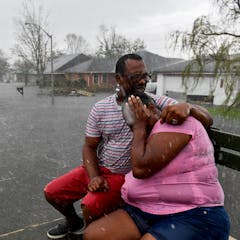
Articles on Heat wave
Displaying 61 - 80 of 173 articles

Beekeepers in British Columbia reported honeybee deaths during the 2021 heat dome. Other insects may also be at risk.

Emission of greenhouse gases is on the rise, an indication that the worst lies ahead.

The risk from heat waves is about more than intensity – being able to cool off is essential, and that’s hard to find in many low-income areas of the world.

While surface temperatures were about the 6th warmest on record in 2021, the upper oceans were at their hottest – and they’re a stronger indicator of global warming. A top climate scientist explains.

A hurricane that wreaked havoc from Louisiana to New York City, the Texas freeze and devastating western wildfires topped NOAA’s list of billion-dollar disasters in 2021.

US disasters in 2021 told a tale of two climate extremes. A climate scientist explains why wet areas are getting wetter and dry areas drier.

Southern California is on the front line of climate change, and recent survey data shows that residents are feeling its effects in many ways.

Studies show climate change is raising the risk of cascading hazards that alone might not be extreme but add up to human disasters. Communities and government agencies aren’t prepared.

More than half of the world’s population lives in cities, and that share is growing. Rapid climate change could make many cities unlivable in the coming decades without major investments to adapt.

Hot, humid population centers are becoming epicenters of heat risk as climate changes worsens. It’s calling into question the conventional wisdom that urbanization uniformly reduces poverty.

Excessive heat puts your body at risk for organ damage. When workers don’t have a chance to cool off at home between shifts, that harm can accumulate.

America’s public schools, which are over 40 years old on average, are not equipped to handle rising temperatures due to climate change, a new study reveals.

Southern Québec is warming twice as rapidly as the rest of the world due to the progressive loss of snow cover. An average annual warming of 3 C to 6 C is expected by the end of the century.

With a massive territory to manage, all actions taken - to prevent, to detect and to fire fight - aren’t enough.

A new attribution study finds human-caused climate change made Europe’s July floods more likely. What about Tennessee’s flooding? An atmospheric scientist explains how scientists make the connection.

Not all forests respond to hotter and drier conditions in the same way.

Not every extreme weather event is caused by climate change, but heat waves that were once ridiculously improbable are showing up more often. Just ask Portland.

Heat stroke is a danger in extreme temperatures, but a major risk factor for dying during a heat wave is cardiovascular disease and other pre-existing health conditions.

During a 2015 heat wave, scientists watched as a coral reef died before their eyes. By the end of the century, almost all the world’s corals will be gone if climate change continues at this pace.

Left untreated, heat stroke can be fatal, and the elderly are the most at risk.
